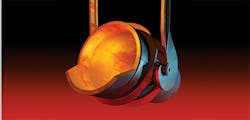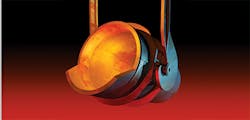Avoid middlemen to get top prices for your scrap
A busy dentist finds how profitable - and easy - working with direct refiners can be
by Michelle Caldwell, DDS
The Lakewood, Colorado, office of Michelle Caldwell, DDS, is an unusually busy one. Dr. Caldwell prides herself on taking care of as many of her patients' needs as possible, which means that she routinely performs difficult extractions, periodontal surgery, implants, root canals, and extensive procedures involving dentures, crowns, and bridges. She even employs a nurse anesthetist for sedation.
Because of her hectic schedule, Dr. Caldwell had never been able to devote much thought or effort to how the scrap metal that had accumulated in her practice could be converted into cash.
"I was never really motivated to investigate how I could get the most money possible for my precious metal scrap," she said. So when a middleman representing a precious metals refiner stopped by Dr. Caldwell's office and said he would pay her cash on the spot for her scrap metal, she was initially tempted. "But when he said he would pay me around $1,400, my instincts told me this was a lowball offer."
Dr. Caldwell said no thank you to the proposal and contacted Heraeus Kulzer Precious Metal Refining, which had been referred to her by another dentist. It turned out that Tony Circelli, the refining manager for Heraeus Kulzer, was scheduled to be in the Denver area visiting a large dental laboratory customer, so he paid Dr. Caldwell a visit.
"I just handed Tony a bag containing the crowns, screws, and other metals I'd collected, and he went on his way," Dr. Caldwell said. Within two weeks, Heraeus Kulzer had received, melted, and assayed Dr. Caldwell's scrap metal, and sent her a check for over $5,600.
"I was shocked, and very pleasantly so," she said. "I had a hunch that the other refiner's offer was low, but I had no idea just how bad a deal it would have been for me."
According to Mr. Circelli, there are several possible reasons for the significant discrepancy between his company's payment to Dr. Caldwell and the other refiner's offer. One is the fact that it is impossible to accurately determine the true value of scrap metal until it has been melted and assayed. For example, a yellow metal could be as high as 75% gold, or it could be 35% gold, which is worth less than half as much.
Similarly, a white metal could be anywhere from 2% to 55% gold, or it could be nickel, chrome, iron, cobalt, or some other metal that is worth little from a refining standpoint. "If someone is going to make you a cash offer based only on a visual inspection, they're always going to base it on the low end of the possible value range, which means the customer will get 30% to 40% less than sending to an end refiner," Mr. Circelli said.
Another explanation is the fact that many refiners have to cover the cost of sales commissions for the middlemen they use, which means less money is available to pay the dental practice. For this reason, Mr. Circelli recommends that practices work only with direct refiners and not middlemen. Yet another reason for the payment discrepancy is that many refiners lack the state-of-the-art technology to efficiently extract the maximum amount of precious metal from the scrap they refine.
Finally, another possible reason some refiners pay so much less than others may relate to ethics. "I've been in this business for 38 years," said Mr. Circelli, "and the sad truth is that not all precious metal refiners feel a moral obligation to give their customers the best possible return."
Mr. Circelli noted that dental laboratories have historically been more diligent about maximizing the value they receive for their scrap metal than have dental practices. "Because labs have to purchase the precious metals they use to create crowns and other prostheses, they're typically more acutely aware of the value of the scrap that accumulates in their facilities," he said. As a result, many labs insist on refining their scrap metal with direct refiners that have a reputation for paying fair prices. This is why the middlemen tend to prey more on dental practices than labs.
However, as word gets out about how dealing with reputable refiners can increase dental practice revenues by thousands of dollars annually, more dental practices are foregoing cash-on-the-spot offers from middlemen. In the words of Dr. Caldwell, "Now that I know how much more money I'll be paid, and how easy the process is, I'll never again be tempted to use a middleman for my precious metal refining. I never realized what a big difference in return it would be dealing with a direct refiner like Heraeus Kulzer. All I want is to get paid fair market value for my scrap."
After all, she says, "These materials are called 'precious' for a reason."
A graduate of Creighton University Dental School, Michelle Caldwell, DDS, has owned her Denver practice for 12 years. She performs a wide range of procedures, including extractions, implants, root canals, prosthetics, and periodontal surgery. Her state-of-the-art practice also offers a nurse anesthetist for sedation.

